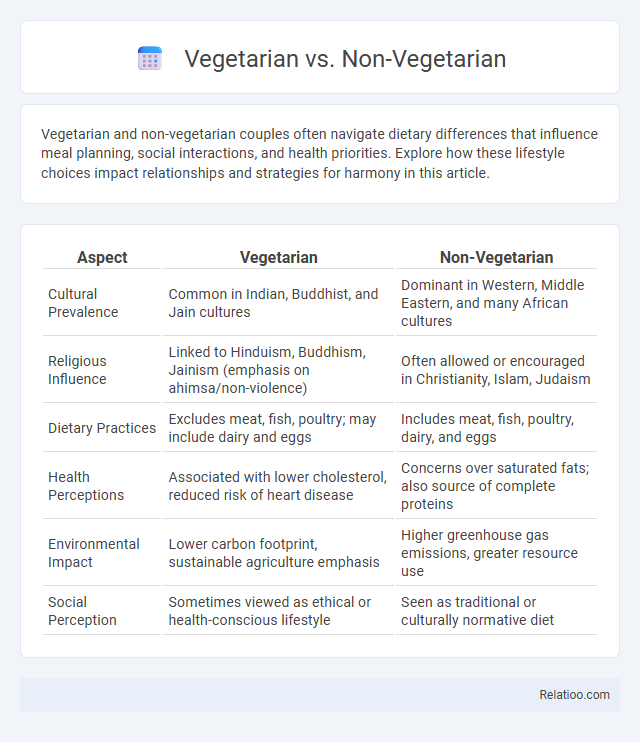Vegetarian and non-vegetarian couples often navigate dietary differences that influence meal planning, social interactions, and health priorities. Explore how these lifestyle choices impact relationships and strategies for harmony in this article.
Table of Comparison
| Aspect | Vegetarian | Non-Vegetarian |
|---|---|---|
| Cultural Prevalence | Common in Indian, Buddhist, and Jain cultures | Dominant in Western, Middle Eastern, and many African cultures |
| Religious Influence | Linked to Hinduism, Buddhism, Jainism (emphasis on ahimsa/non-violence) | Often allowed or encouraged in Christianity, Islam, Judaism |
| Dietary Practices | Excludes meat, fish, poultry; may include dairy and eggs | Includes meat, fish, poultry, dairy, and eggs |
| Health Perceptions | Associated with lower cholesterol, reduced risk of heart disease | Concerns over saturated fats; also source of complete proteins |
| Environmental Impact | Lower carbon footprint, sustainable agriculture emphasis | Higher greenhouse gas emissions, greater resource use |
| Social Perception | Sometimes viewed as ethical or health-conscious lifestyle | Seen as traditional or culturally normative diet |
Nutritional Profiles: A Comparative Analysis
Vegetarian diets, rich in fiber, vitamins, and antioxidants, emphasize plant-based nutrients while often requiring supplementation for vitamin B12 and iron. Non-vegetarian diets provide higher bioavailable proteins, essential amino acids, vitamin B12, and heme iron, contributing to muscle maintenance and cognitive function. Food taboos, influenced by cultural or religious beliefs, restrict certain nutrient sources, potentially impacting intake of key micronutrients such as zinc, calcium, and omega-3 fatty acids, necessitating careful dietary planning to avoid deficiencies.
Health Benefits of Vegetarian Diets
Vegetarian diets are rich in essential nutrients such as fiber, vitamins C and E, and antioxidants, which can lower the risk of chronic diseases including heart disease, hypertension, and type 2 diabetes. Studies show that those who follow vegetarian diets generally have lower body mass indices and improved cholesterol levels compared to non-vegetarians. Considering your health, adopting a vegetarian diet eliminates exposure to hormones and antibiotics often found in meat, promoting better overall wellness while respecting cultural food taboos related to animal consumption.
Health Impacts of Non-Vegetarian Diets
Non-vegetarian diets provide essential nutrients like complete proteins, vitamin B12, iron, and omega-3 fatty acids crucial for muscle development, brain function, and overall health. However, excessive consumption of red and processed meats is linked to increased risks of heart disease, certain cancers, and hypertension due to high saturated fats and cholesterol levels. Your dietary choices should balance these health benefits and risks while considering cultural food taboos that may influence acceptable food options.
Protein Sources: Plant-Based vs Animal-Based
Plant-based protein sources such as legumes, tofu, tempeh, and quinoa provide essential amino acids and are rich in fiber and antioxidants, making them a staple in vegetarian diets. Animal-based proteins like chicken, beef, fish, and dairy offer complete protein profiles with high bioavailability, supporting muscle repair and growth in non-vegetarian diets. Food taboos often restrict certain animal proteins due to religious, cultural, or ethical reasons, influencing the choice between plant-based and animal-based protein consumption globally.
Environmental Impact: Sustainability of Diet Choices
Vegetarian diets generally have a lower environmental impact than non-vegetarian diets due to reduced greenhouse gas emissions, land use, and water consumption associated with plant-based foods. Non-vegetarian diets, especially those high in red meat, contribute significantly to deforestation, biodiversity loss, and resource depletion. Food taboos can influence your dietary choices, potentially promoting sustainability by encouraging consumption of locally available, seasonally appropriate foods that minimize ecological footprints.
Ethical Considerations in Food Selection
Ethical considerations in food selection often center on the treatment of animals and environmental impact, with vegetarian choices minimizing harm by excluding meat and aligning with animal rights principles. Non-vegetarian diets raise concerns about factory farming, animal welfare, and sustainability, challenging individuals to balance nutritional needs with ethical values. Your food decisions also intersect with cultural food taboos, which impose moral restrictions and shape dietary behavior beyond mere nutritional or ethical reasoning.
Cultural and Regional Influences on Dietary Preferences
Cultural and regional influences significantly shape dietary preferences, with vegetarianism often rooted in religious beliefs and ethical values, particularly in regions like India where Hinduism and Jainism promote plant-based diets. Non-vegetarian diets prevail in areas with abundant animal resources, such as coastal and pastoral communities, reflecting local ecology and traditions. Food taboos vary widely, influenced by cultural norms, religious doctrines, and historical contexts, leading to restrictions on certain meats, preparation methods, or consumption times that reinforce community identity and social cohesion.
Common Myths and Misconceptions
Common myths surrounding vegetarian diets include beliefs that they lack sufficient protein and essential nutrients, which recent studies have disproven by highlighting plant-based sources rich in protein and vitamins. Non-vegetarian diets are often perceived as superior in providing strength and vitality, yet excessive consumption of red and processed meats has been linked to health risks like heart disease and cancer. Food taboos frequently stem from cultural and religious traditions, leading to misconceptions about the safety or morality of certain foods without scientific backing.
Tips for Transitioning Between Diets
Transitioning from a non-vegetarian to a vegetarian diet requires gradual incorporation of plant-based proteins like lentils, tofu, and chickpeas to maintain nutritional balance and ease digestive adjustment. When shifting from vegetarian to non-vegetarian, start with lean meats such as chicken or fish to minimize gastrointestinal discomfort while ensuring adequate intake of essential amino acids and vitamin B12. Being mindful of cultural food taboos during dietary transitions is crucial; researching local customs and avoiding restricted foods can foster respect and acceptance in diverse social settings.
Which Diet Suits Your Lifestyle?
Choosing between a vegetarian and non-vegetarian diet depends on your lifestyle, health goals, and ethical beliefs, as each offers distinct nutritional profiles and environmental impacts. Vegetarians benefit from higher fiber intake and lower cholesterol levels, while non-vegetarians gain more complete proteins and essential nutrients like vitamin B12 and iron. Understanding cultural food taboos can also influence your diet choices by aligning your meals with personal values and social customs.

Infographic: Vegetarian vs Non-Vegetarian
 relatioo.com
relatioo.com